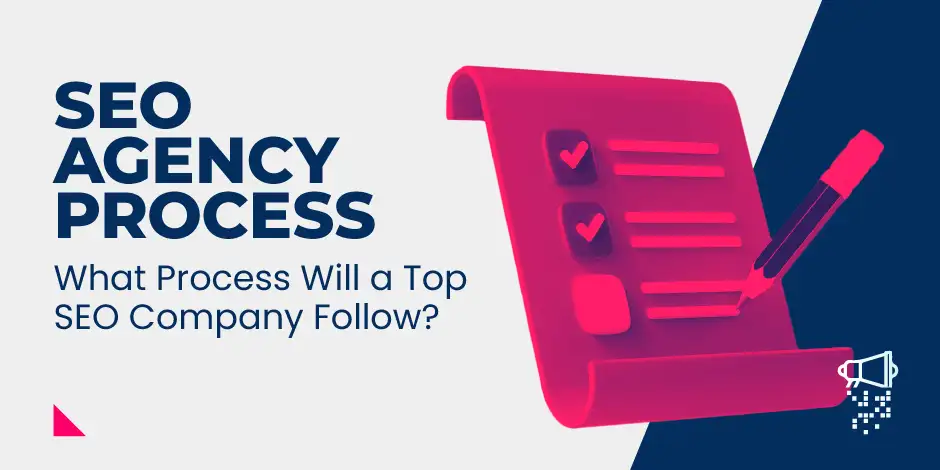
Hiring an SEO agency can be nerve-wracking.
Whether this is your first time dipping your toe into the world of search or you’ve been burned by a bad agency in the past, it’s easy to spend a lot of energy looking for signs that your new provider can’t be trusted.
However, this can lead to a lot of anxiety and even put some people off doing SEO entirely. It’s just as important to know what a positive experience working with a top-tier SEO company will look like. So, let’s talk about the approach the best agencies out there will take to creating an SEO strategy, from beginning to long-term search engine success!
What makes a good SEO agency process?
1. Discovery
It’s easy to discount the importance of the discovery process, especially if you’re new to SEO. You might assume that because an SEO company ranks highly or has a professional-looking website, they are automatically the best fit for you, or that SEO is essentially a science, so one agency is as good as them all.
In both cases, you risk falling into the hands of providers using outdated or outright manipulative tactics and charging a premium for them. The SEO discovery process is your greatest weapon in telling the amateurs from the masters.
DISCOVERY SESSION
The discovery session is a bit like a first date. It’s the first proper meeting you’ll have with a prospective SEO provider after initiating contact through their website, email or social media channels. The objective is just what it says on the tin: discovery. Like a first date, it’s about learning more about one another and figuring out if you have potential as a partnership; and, like a first date, it’s important to know:
- What you’re looking for
- What you expect to get out of the conversation
- What the red flags are
Preparation is your greatest weapon during the discovery session, helping you identify the characteristics of a high- or low-quality SEO company and, frankly, sniff out the bullsh*t. Luckily, we’ve got you covered with the ultimate guide to preparing for an SEO discovery call.
PROPOSAL
In some cases, a client (that’s you, by the way) will shop around the SEO world for multiple agencies, who will then be asked to pitch for the project. This is particularly common with larger brands. Each agency then puts together an SEO proposal to win the potential client’s business.
SEO proposals are essentially outlines of the agency’s plans for the project and often include several elements otherwise found later on in the process, such as auditing, competitor analysis, identifying potential outreach targets and initial keyword research. After all, to make suggestions, you first have to get the lay of the land.
A great SEO proposal will be easy to understand (not packed with huge blocks of jargon-heavy text), visually engaging and demonstrate both the value and the expertise of the agency that put it together. It’ll likely contain a basic roadmap, timeline and budget for the project, which can, of course, be tweaked through conversations later down the line.
SEO AGREEMENT
The last stage of the discovery process is where you and your chosen agency sign on the dotted line so that the real work can begin!
We don’t mean to spook you or anything, but reading your SEO client contract is the last chance you have to catch anything fishy before you’re tied to doing business with an agency. Contracts can be terminated, but ideally, you don’t want to get to that stage as it is often costly - both in terms of termination fees and money already spent on a project that is yielding no results.
A good SEO agreement is the foundation of a strong and mutually beneficial partnership. It should include:
- Project deliverables
- SEO KPIs
- Contract duration
- Fees (including the cost of SEO services, termination fees, late payment charges and fees for work outside of the project scope)
- Terms of payment
- Cancellation terms
- Client responsibilities
- Dispute resolution
- Ownership of work
2. Auditing
Want to rank highly for your target keywords? Cool. You and everyone else, buddy. There’s a reason - probably quite a few, in fact - that you’re not already there, and that’s our first order of business.
A good SEO strategy is not built from a tick-list of tasks that an agency carries out for each and every client’s website. It’s built from a thorough assessment of that website’s current performance on search engines. Before you can start looking at what you need to do right, you need to fix what you’re doing wrong.
The SEO audit is a pretty mammoth process (which varies in scale depending on the size of the website, of course) that looks at your website’s technical aspects, backlink profile and on-site content to identify its strengths and weaknesses, as well as any glaring issues requiring immediate attention.
For example, you might have a well-built website with great content, but Google is wary of you because you either have no backlinks or a bunch of crappy ones. Alternatively, you might have a technical issue that is preventing any of your pages from getting indexed, meaning that as far as search engines are concerned, they don’t exist!
Your SEO audit will give you the right jumping-off point for the project. It should cover:
Technical SEO
- Google penalties
- Site security
- Mobile-friendliness
- Page speed
- Site structure and navigation
- UX
- Crawlability
- Duplication
- URL structure
- Redirects
- Status codes
On-page SEO:
- Keyword targeting
- Content structure
- Images and video
- Meta data
- Schema
- Internal linking
Off-page SEO
- Backlinks
- Competitors
- Content gaps
You should also bear in mind that the audit isn’t a one-time thing. New issues can easily start to crop up as old ones are fixed, so it’s important that your site is being audited on a regular basis throughout the project to catch and immediately fix any problems before they have a chance to do damage.
3. Technical SEO
Now you’ve identified all the things stopping you from hitting the top spot, it’s time to fix them. Technical SEO repairs usually take place concurrently with the on- and off-page strategy portions of a good SEO process. There’s no point trying to implement a cracking content strategy on a website that is poorly structured or carrying a bunch of errors, after all.
There’s no rule as to how long this could or should take. If you’ve worked with an SEO-savvy web developer, there might only be a few issues that need tweaking before the site’s ready to be updated with world-class content. If you’re working with an old website, a self-build or one designed by a sub-par developer, we could be here a while.
In some cases, you and your SEO provider might agree to re-launch a brand-new website. This usually doesn’t come as much of a surprise and may have been discussed in the earlier stages of the process. It comes with the additional expense of web development, which might be outsourced to a specialist, but if you’re working with a trustworthy SEO agency, they won’t be trying to make you pay for things you don’t need.
4. Strategy
The pages currently occupying the top spots for all your target keywords didn’t get there by accident. SERPs are somewhat of a battlefield, and to win the day on a battlefield, you need a good SEO strategy.
KEYWORD RESEARCH
The most important thing to know about keyword research is that most people do it wrong. There’s an extremely common misconception among both amateur and, unfortunately, professional SEOs that search engines are basically keyword-matching machines. This hasn’t been true for several decades now, and when it comes to Google, this has never been the case.
It’s not as easy as finding a high-volume keyword that is vaguely applicable to your business, sticking it all over your page and meta data and hoping for the best. If your agency is taking this approach as part of their SEO process, it should set some serious alarm bells ringing. Search engines are sophisticated machines capable of understanding and interpreting the nuances of human language and are interested in serving their user’s interests.
Keyword research in 2022 should be heavily focused on:
- Relevancy
- User intent (also known as search intent)
- Topical authority
- Semantic search
- SERP features
COMPETITOR ANALYSIS
Returning to our battlefield analogy for a second: before you charge into battle, wouldn’t it be ideal to gather as much intel as possible on your opponent? That’s exactly what competitor analysis is all about in the strategy stage of an SEO process.
The truth is, there isn’t a lot of room at the top. In fact, 75.1% of all clicks go to the first three results on SERPs. In many cases, SEO agencies will analyse the results page for your target keywords to figure out how it’s interpreting the term and what pieces of content it believes are best satisfying user intent. This means looking at the best-performing companies in your field and taking notes.
Competitor analysis can help you:
Generate fresh content ideas with a content gap analysis
Identify new outreach targets with a backlink analysis
Determine search intent with a SERP analysis
IDENTIFYING OUTREACH TARGETS
We cannot overstate the importance of links in your SEO strategy. We also cannot overstate how bad most link-building strategies are.
In the pre-Google search engine Stone Age, users were bombarded with low-quality keyword-stuffed results every time they looked something up. Then, along came Google’s PageRank algorithm, which was the first to use links as a critical ranking factor. If a well-known trustworthy (in technical terms: high-authority) website links to a less well-known domain, it passes some of its trustworthiness onto the lesser-known site.
The key word (ha… get it?) here is ‘high-authority’. PageRank and the numerous link-focused algorithms that have followed it have been grossly misinterpreted by SEO agencies as “more links = better” for years.
Links matter, but not just any links: natural, relevant ones from high-authority domains. When putting together your SEO strategy, the agency should therefore be focused on identifying authoritative outreach targets - news sites, online magazines, blogs - that would naturally publish content in your niche.
CONTENT PLANNING
Right… so you’ve got your keyword research, competitor analysis and outreach targets. Now it’s time to turn all of this information into some content ideas. Content is the shiny stuff of SEO. It’s the front-facing element that pulls in the (digital) crowds while technical SEO and link-building keep things ship-shape behind the scenes.
Lots of people underestimate the amount of research and planning that goes into creating great SEO content. The right agency will have a data-backed justification for every piece of content they suggest, from revamping your website copy to updating your blog section and pitching ideas to your outreach targets.
Content planning should cover both on-site and off-site SEO:
On-site SEO:
- Homepage
- Landing pages
- Product pages
- ‘About’ page(s)
- Blogs
Off-site SEO:
- Digital PR campaigns and assets
- Guest blogging (if applicable)
5. Implementation
This is where things get really exciting. If your SEO agency has followed the right process up to this point, implementation should be a breeze.
Implementing your SEO strategy requires a collaborative effort between you and your provider. This is why clarifying client responsibilities in the discovery stage of your SEO agency process is so important: it means that when it’s time for deliverables to be produced, get approved and be sent live, everything runs smoothly.
The implementation stage covers:
ON-SITE OPTIMISATION: Usually happening in tandem with content creation and technical SEO changes, on-site optimisation is making sure that your on-site pages are targeting the right keywords with the right content.
CONTENT CREATION: SEO projects often involve a lot of new content being produced, including overhauling landing pages as well as producing new ones, creating a steady stream of blogs and putting together off-site assets as part of link-building campaigns.
SIGN-OFF: The approval process can become a major sticking point in SEO projects, so both you and your SEO agency must be organised. Approvals should be streamlined so that content is going live regularly and is always up to date.
UPLOADING: It’s time to send your content live. Some companies prefer to have a member of their in-house team take charge of uploading, while others are content to leave everything in the hands of their SEO agency. Whoever is responsible should be outlined at an early stage of the SEO process.
DIGITAL PR: One of the most effective link-building strategies is digital PR: producing a unique data set that news publications will want to write about to earn a natural, relevant link from a high-authority domain. These campaigns are produced on a rolling basis, brainstormed by the SEO agency and often respond to seasonal trends or events, so are part of the implementation stage.
6. Reporting
Finally, the last stage of the SEO process is reporting. SEO reports are usually delivered to the client by the agency every month, although some providers prefer quarterly reporting. The purpose is to track the progress of the SEO KPIs established at the outset of the project using a variety of metrics. These might include, but are by no means limited to:
- Rankings
- Traffic
- Conversions
- Backlinks
- CTR
- Bounce rate
- Page speed
- Session duration
All of these results can then be used to attribute increases in revenue to your SEO efforts and calculate the ROI of the project.
The important thing to remember about SEO reports, particularly in the beginning stages of working with an SEO agency, is that it might take a few months before you start seeing increases. If the project is considerable in scale - like a site relaunch or a large eCommerce website with thousands of product pages, for example - it could take even longer.
It’s a cliche, but SEO is a marathon, not a sprint. The ideal scenario is that you’ll avoid the fate of the 65% of companies who have already worked with multiple SEO agencies, hit the jackpot with your first one and work with them long-term to continually improve your site and keep pace with Google’s 4,500+ annual algorithm changes.
SEO is also not a single, linear process with a beginning and an end. It’s a cycle. Once your initial strategy has been implemented, it’s time to go back to the drawing board and come up with some new ideas to keep things moving. After all, Google loves nothing more than fresh content. Achieved all your KPIs? Okay, first of all, wow. It’s time to set some more. If your monthly report is showing some downward motion, it might be time for a fresh audit and a new strategy.
Hire Reboot Online
Choosing a trustworthy SEO agency can be tough. Reboot Online Marketing is an industry-leading SEO agency. We have a highly-skilled team of 60+ multilingual experts in the four pillars of search: technical SEO, link-building, content and digital PR. We are renowned for engaging digital PR campaigns that earn natural, high-quality links for companies such as Uswitch, eToro, OnBuy, Just Eat and Money.co.uk from high-DA publications including the Daily Star, the Mirror and OK! Magazine.
We also conduct in-house SEO experiments alongside some of the biggest names in the industry to stay ahead of the curve and gain as much insight as possible into exactly what search engine algorithms are looking for.
For more information, check out our case studies or get in touch with us today.